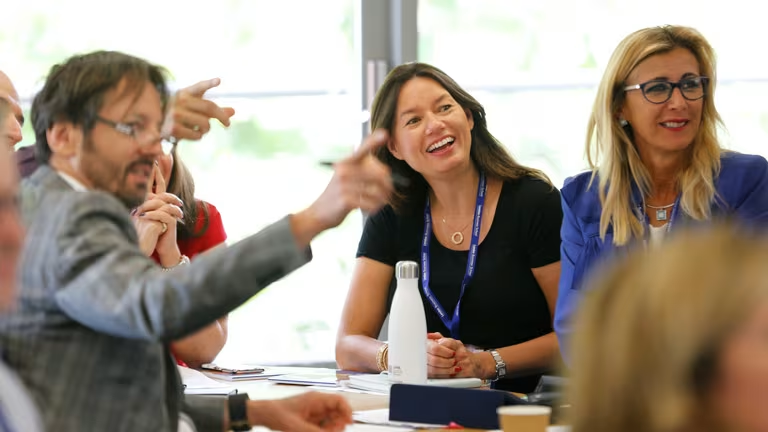
Partner with us to transform your organisation
Inspire your people and power the future of your organisation with our award-winning Executive Education customised learning solutions.
Our work withPlease enter a keyword and click the arrow to search the site
Or explore one of the areas below
The machines are coming... but there’s still hope for the rest of us

What does it mean for humans to thrive in the age of the machine? This is the issue that London Business School professors Andrew Scott and Lynda Gratton are wrestling with in their second major exploration project.
The groundbreaking previous collaboration between psychologist Gratton and economist Scott resulted in the 2016 international bestseller The 100-Year Life. It has been translated into 14 languages (15 if you count the pictorial manga version available in Japan) – and corporates as well as governments are paying attention. The book is credited with jolting the Japanese Government, which Gratton now advises, into taking steps to address the issues thrown up by its ageing society – also the aim of the charity The Longevity Forum, which Scott has established.
In September the pair were awarded the MIT Sloan Management Review’s 2018 Richard Beckhard Memorial Award for their article ‘The Corporate Implications of Longer Lives’, based on their research for the book. Taking a 100-year view of human life opens up its totality to scrutiny, not just the working segment. “We’ve talked to hundreds of people since the book came out and one of the things they ask is: what about technology and how does that impact on longevity? They’re beginning to realise how interconnected things are,” observes Scott.
The next step was to broaden the focus to include the rapid advance of technology and the wider social changes that are happening in consequence and independently – a massive agenda. But although, as they stress, it is still a work in progress, Scott and Gratton cautiously believe they are on the way to cracking it. Two things, at least, are already clear. The first is that the main story is not the machine – it’s people. Most of those writing about the fourth (or sometimes fifth) industrial revolution assume that it’s essentially a hardware story in which ever more perfected technology eats up the world, leaving less and less space for weak, fickle, messy humans.
This has prompted many – including luminaries such as Bill Gates, Elon Musk and Stephen Hawking – to warn of a turning point when humanity risks losing control of the technology it has created, generating problems rather than solutions, and a longer life leading to years of impoverishment and misery rather than fulfilment and opportunity. While taking these dangers seriously – “we’re not Pollyannas” – Scott and Gratton are convinced that this is the wrong way round. The real agenda, they argue, is about being human and what that means.
What do we need to live as long, humanly and healthily as possible, and in a way that is as fulfilling, meaningful and economically secure as possible? How can we change our social and economic practices so as to benefit from the gifts of better technology and longer lives?
So, the second starting point for this new research is that, as humans, we have agency, even in the face of giant abstract forces such as increasing life expectancy and technological advances. This is controversial and was criticised in some quarters in relation to The 100-Year Life. But the pair are unrepentant. “It’s complicated,” admits Scott. “Will it be easy? No. Will everyone prosper? No. But, given our new endowments of extraordinary technology and longer life, the starting point that everything is terrible can’t be right. The question is, how can we leverage these things to live a better and more human life?”
After all, identifying and investing in opportunities, and solving problems, is what humans do, as Gratton points out. (As Warren Bennis once remarked, “Problem-solving is the task we evolved for – it gives us as much pleasure as sex.”) She notes that, apart from asides about jobs, contemporary accounts of technology and ageing treat them as inscrutable external forces, a bit like tectonic plates shifting, rather than factors directly engaging with personal lives. Most people are uneasily aware of the landscape changing shape around them and some are curious about what they see, but many “are struggling to build a narrative about what these developments mean for them and for their futures,” Gratton says.
Creating a narrative that makes sense of the big sweep of change in terms of personal lives is the first step towards human agency. And, as Gratton and Scott insist, it’s urgent. First, because today’s familiar social and economic frameworks are coming apart at disconcerting speed. Second, sculpting the new endowments of time and technology into human benefit will require individuals to be curious about the future and be prepared to invest in order to take charge of their lives in ways that would have been unthinkable in the recent past. For roughly a century, life in the advanced economies has followed a standard predefined pattern: a linear, three-stage progression from education to work to retirement.

Inspire your people and power the future of your organisation with our award-winning Executive Education customised learning solutions.
Our work with
Think at London Business School: fresh ideas and opinions from LBS faculty and other experts direct to your inbox
Sign up